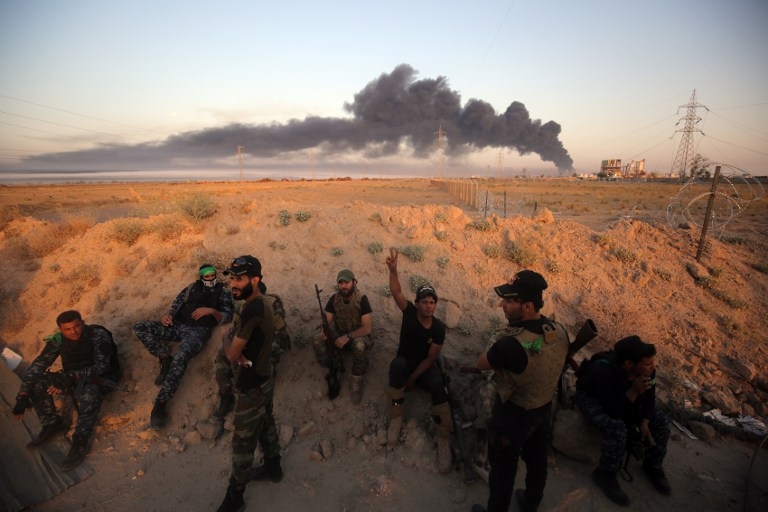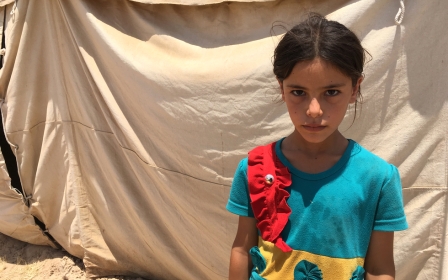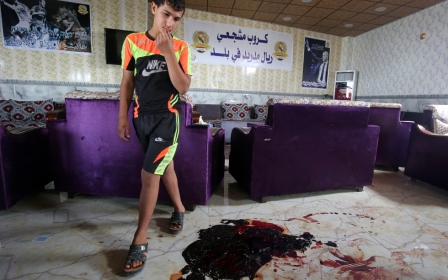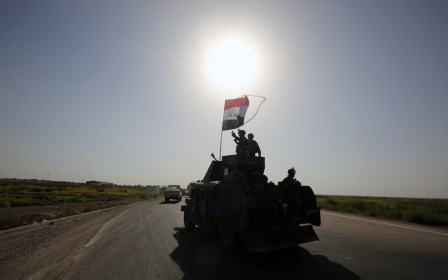Iraqi forces on Fallujah outskirts as anti-IS offensive stalls

Iraqi forces have slowed down their offensive to take back the Islamic State-held city of Fallujah in the face of mounting concerns for the fate of trapped civilians and resistance from the militant group.
After a week of shaping operations aimed at breaking the two year siege of Fallujah, which lies about 50km west of Baghdad, elite forces launched a new, more aggressive phase on Monday morning.
Prime MInister Haider al-Abadi announced on Sunday that Iraqi Security Forces would enter the city in two days.
But they have so far been unable to reach the city centre and battle Islamic State (IS) fighters in the streets of one of their historical strongholds.
On Wednesday, Abadi said concern for the estimated 50,000 civilians the UN has said IS was using as human shields was slowing progress.
"It would've been possible to end the battle quickly if protecting civilians wasn't one of the foundations of our plan," he told commanders in comments broadcast by state television.
Iraq's parliament speaker, Salim al-Juburi, held talks with officials from Anbar province, where Fallujah is located, as well as commanders and tribal leaders on the humanitarian issue.
He discussed "ways of rescuing the families being held hostage and opening safe corridors for them," his office said in a statement.
Inside Fallujah, trapped residents were under increasing pressure from worsening shortages and nervous IS fighters preparing for a desperate holdout.
No aid has reached Fallujah since September last year and residents have been living on dates, dirty water from the Euphrates and animal feed.
Given the involvement of the predominantly Shia Popular Mobilisation Units in the Fallujah offensive, concerns have also been raised of possible retribution killings against Sunni civilians which militia leaders have sought to allay.
"The blood of Christians, Muslims, Yazidis and Turkmen is all equal when it falls on Iraqi soil,” Dhafer Lawees, a spokesperson for the Babylon Battalion, the only Christian PMU in Iraq, which is taking part in the fighting in Fallujah, told Middle East Eye this week.
Heavy toll
The Norwegian Refugee Council said another 300 families managed to flee areas around Fallujah in the past 24 hours, bringing to about 5,000 the number of people who escaped since the start of the operation.
Commanders said another factor slowing the operation is the resistance they are meeting from militant fighters.
A police colonel on the outskirts of Fallujah said "every time our forces try to push in, they encounter really tough defence systems set up by Daesh [IS]".
The closest Iraqi forces have come to moving into the centre is from the south, where they entered a suburb of Fallujah, but were pinned back by a massive counterattack on Tuesday.
Iraqi commanders say they have killed dozens of IS fighters since the start of the operation on 22 May but have been coy about releasing their own casualty figures.
Yet the number of coffins being sent back to some of Iraq's southern provinces and of burials reported in the Shia Muslim holy city of Najaf suggest that the anti-IS camp is also paying a heavy price.
"Since the start of the operation, we have received about 70 martyrs, probably a bit more," said a member of the security forces posted outside Najaf's Valley of Peace, the world's largest cemetery, where many from Iraq's Shia majority bury their dead.
Officials in Basra said the southern province had lost 26 fighters from the Hashed al-Shaabi paramilitary force alone.
An official in Najaf province, who did not want his name to be published, confirmed 12 deaths from the province.
Medics also reported many wounded from the battle for Fallujah. Since Monday, just two of the capital's hospitals received 97.
Middle East Eye propose une couverture et une analyse indépendantes et incomparables du Moyen-Orient, de l’Afrique du Nord et d’autres régions du monde. Pour en savoir plus sur la reprise de ce contenu et les frais qui s’appliquent, veuillez remplir ce formulaire [en anglais]. Pour en savoir plus sur MEE, cliquez ici [en anglais].




